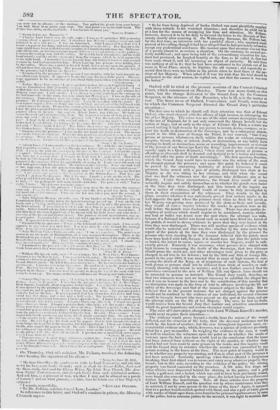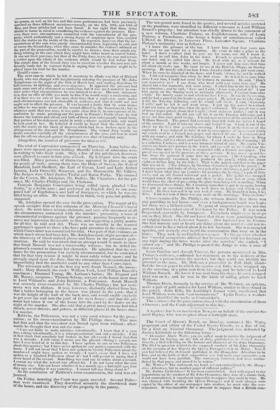Oxford will be tried at the present sessions of the
Central Criminal Court, which commenced on Monday. There was some doubt on this point, but the charge delivered to the Grand Jury by the Common Sergeant, in the absence of the Recorder, who is ill, sets the matter at rest. The three ea- es of Oxford, Courvoisier, and Gould, were those to which the Common Sergeant directed the Grand jury's particular attention— The fir,A ease to which he should call their attention was that of Edward Oxford, who ::tood charged. with the offence of high treason, in attempting the of her Majesty. The crime was one of the most serious description knowit to the law of England, for it not only concerned the Queen herself, but the nation at large, and so early as the reign of Edward the First, a statute was passed making it hi,lb treason for any person to invent, devise, compass, or in- tend the death or destruction of the Sovereign; and by it subsequent statute, passed in the Stith year of George the Third, it was enacted, " that if any person or persons whatsoever, shall, within the realm or without, compass, Imagine, invent, devise, or intend, death, or destruction, or any bodily harm tending to death or destruction, maim or wounding, imprisonment Or restraint of the person of our Sovereign Lord the King," (and the law would of course equally apply to a Queen Regnant,) "then every such person or persons se offending as albresaid shall be deemed and declared to be a traitor and traitors, and shall suffer the pains of death accordingly." The first quest Mu,' therefore, NrIlich the Grand Jury would have to consider was the nature of the overt act charged against the prisoner; and upon this point he believed it would be proved by the concurring testimony of several witnesses, that the prisoner, being armed with a pair of pistols, discharged two shots at her Majesty as she was riding in her carriage, and that when the second shot was tired the witnesses saw the prisoner take deliberate aim at her Majesty. 'Under these circumstances, the Grand Jury would of course naturally inquire and satisfy themselvss as to whether the pistols were loaded at the time they were discharged, and this branch of the inquiry was also a matter of evidence, which Ivould of course be duly investigated by them in their examination of the witnesses. They would, in the first place, consider whether it was sulliciently proved that certain marks in the wall opposite the spot where the prisoner stood when Ike fired the pistols as Item' Majesty was passing were produced by the shots so fired ; and secondly, they would of course inquire whether the marks in question were on the wall before the pistols were discharged or after. There tvas also another de- scription of evidence which would require to be considered, namely, whether any lead or bullet was founul near the spot where the attempt was made, because if a flattened bullet was found such as would have fitted the barrels of the pistols, it would be strong evidence to prove that they were loaded at the time they were discharged. There was still another species of evidence which would also be material, and that was this : whether by the noise made by the report of the pistols at the time they were discharged by the prisoner the persons who were standing by at the moment believed that the pistols must have been loaded with ball, because if it should turn out that the pistols were so loaded, the intent to maim, injure, or murder her Majesty, would be suffi- ciently proved. Formerly it was necessary, when persons wure charged with high treason iii compassing the death of the Sovereign, that two witnesses should prove the overt act, and other advantages were given to the party so
charged, to aid him in his defence ; but by the 39th and 40tIk of' George HI., passed in the year MO, it was enacted that hi cases of high treason in :com- passing the death of the King, or of misprision of such treason, the trial of such ;meson or persons shall not be different from trials of murder, or mali-
ciously shooting with intent to nmrder ; and it was further enacted that the provisions contained in the acts of William M. and Queen Anne should not
be extended to persons so indicted. The Grand Jury would, therefore, see that two witnesses were now no longer necessary to establish the alleged fact, and it was an honour to the laws and to the constitution of this country that no distinction was made in the form of trial in offences involving the life and safety of the Sovereign and that of' the meanest subject in the land. But he believed that in the present instance the act charged against the prisoner would not be confined to the evidence of one individual, for several witnesses would he brought thrward who were present on the spot at the time, and saw the attempt made on the life of her Majesty. The case, he had no doubt, would receive from the Grand Jury that mature and attentive consideration which its great importance and serious character would require. The case of Courvoisier, charged with Lord William Russell's murder, would next require their attention.—
The evidence would prove beyond a doubt, from the nature of the wound indict ed, and the sit ual ion of the body, that the deceased nobleman met his dcath by the hands of unoth,r; but the case throughout depended upon .tar- ctonstantial evidence only, which, however, WaS a species of evidence peculiarly fitted for a jury to consider. In weighing the evidence in the case, it would
be well to examine the witnesses upon the point as to whether the marks of violence upon the back area door would lead to the conclusion that the house had been entered from without on the night of the murder, or whether those
marks had not been made by some person on the inside, and this inquiry would lead the Grand Jury to consider whether the murder was committed by any person residing in the house at the time. The next point of inquiry would be as to whether any property was missing., and if so, in what part of the premises it
had been secreted. Generally speaking,, when thieves effected a burglanous breaking, their first object was to secure and carry away whatever property they
found; but in this case, according to the evidence of the police, time missing property was found concealed on the premises. A 101. note, time rings, and other articles were discovered behind the skirting in the pantry, aud a . gold
watch, a gold seal, and a locket, which was said to have been previously missed, were found also concealed in the same place, the locket having been discovered hidden beneath the hearthstone. Now, all these articles were the property of Lord William Russell, and the question was by whose contrivance were they so secreted, if not by some person in the house at the time? Again, it appeared that two pocket-handkerchiefs spotted with blood, and also a pair of white gloves
with marks of blood upon them, were found in the prisoner's portmanteau by some of the police, but in common justice to the accused, it was right to mention that his person, as well as his box and this same portmanteau, had been previously searched on three different occasions—namely, on the 6th, 10th, and lath of May, and these articles had not been found. It was right that these dates should be borne in mind in considering the evidence against the prisoner. How- ever, there were circumstances connected with the concealment of the pro- perty., which undoubtedly cast a strong degree of suspicion upon him, coupled with the 'narks on the inside of the door. He repeated, however, that the cir- cumstances of the case were purely circumstantial from beginning to ena, and of course the GrandJury, when they came to consider the evidence adduced on tbe part of the prosecution, would be careful to dismiss from their minds any thing relating to the case which they might have either heard or reaa of before. It was not thew province, but that of the Petty Jury, to try the ease and return 9. verdict upon the whole of the evidence which would be laid before them. The simple duty of the Grand jury was to ascertain whether the case was suf- ficiently made out to warrant them in saying that the prisoner ought to be placed upon his trial for the murder. Gould's case— The next case to which he felt it necessary to allude was that of Richard Gould, who was charged with burglariously enterine the premises of Mr. John Templeman on the night of the 16th of March last', and stealing therefrom 19 half-crowns, 48 shillings, and seven sixpences. It appeared the prisoner had made sonic sort of a statement or confession, but it was most material to con- sider under what eiremnstances he was induced to do so. ills own statement was, that an offer of 230/. was made to him if he would make a confession, and if so there was no rule of law more clear than that a c.mfession made under such circumstances was not admissible in evidence, and that it could not and ought not to affect the prisoner. It was beyond a doubt: that bv some means or:other he was made aware of the reward offered by the Government ; but in whatever mode that (vas done, it was quite clear that if, in consequence of the confession he made, pointing out the pond in Pocock's }fields Nrilere he had thrown the lantern and chisel, and both of them were subsequently Mond there, that portion of his statement might be made evidence against him, and WOOM be held good in law. Ile believed it would be found that the ehi•el agreed with the marks on the chest of drawers which had been broken open in the sitting-room of the deceased Ma Templeman. The Grand Jury would, no doubt, consider carefully all the circumstances of the case, and bear in mind that the offence charged against the prisoner (vas that of burglary only.
Altogether, the number of prisoners for trial is 237.



























 Previous page
Previous page